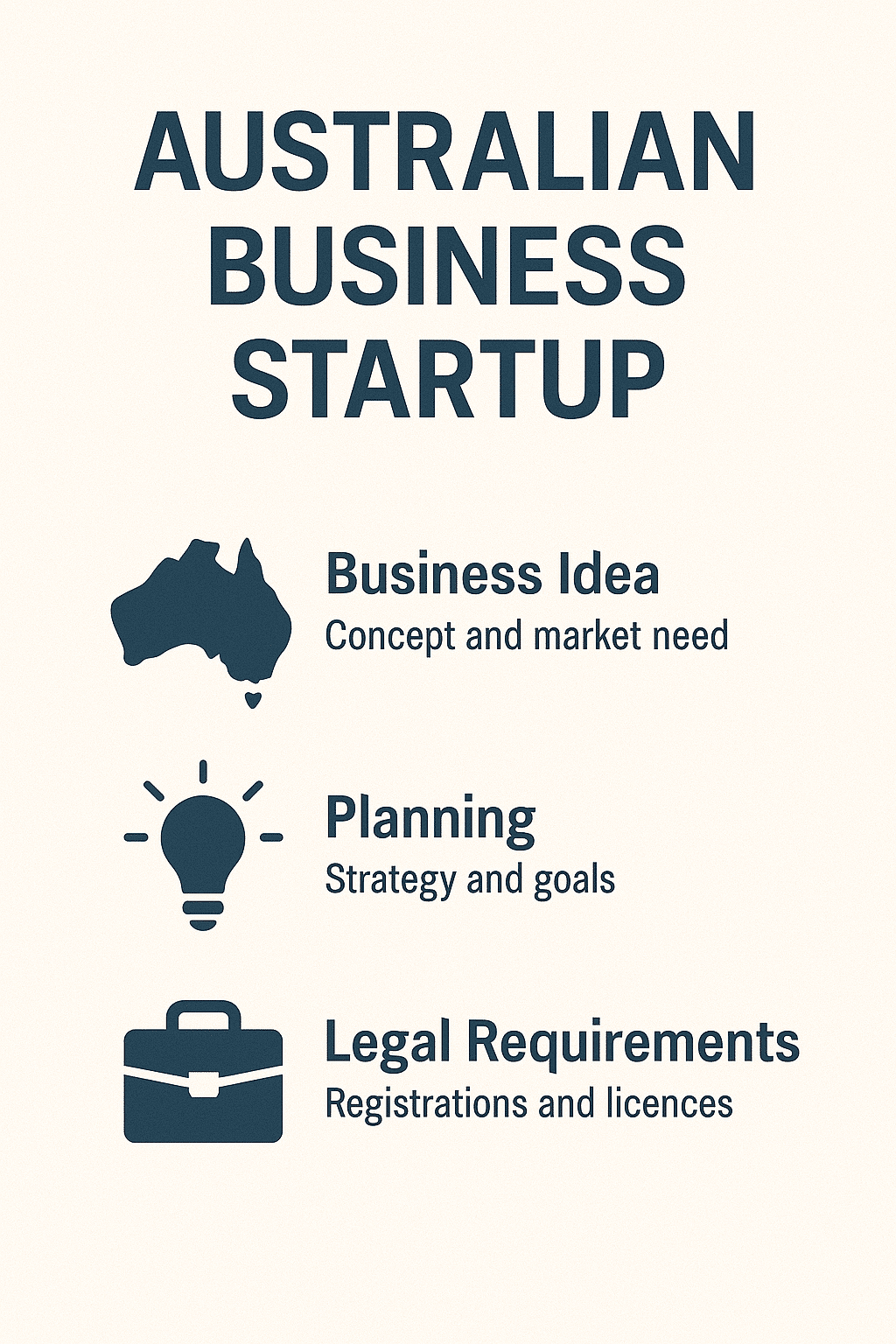Starting a business in Australia can be an exhilarating venture, filled with opportunities to innovate and grow in a vibrant economy.
As an aspiring entrepreneur, navigating the Australia business guide can seem daunting, but with the right tips and resources, you can seamlessly transition from an idea to a thriving enterprise.
Understanding the business registration process in Australia, along with the necessary ABN registration, is crucial in laying a solid foundation for your future success.
With supportive business laws in Australia designed to foster entrepreneurship, small business owners have a wealth of options to explore.
In this guide, we will empower you with the essential tools, insights, and success stories to confidently embark on your business journey in Australia.
Understanding the Australian Market
Before you start a business in Australia, it’s crucial to gain a deep understanding of the local market.
This section will explore key industry insights, help you identify opportunities, and introduce valuable market research tools.
Key Industry Insights
Australia’s economy is diverse and robust, with several key industries driving growth. The service sector, including finance, healthcare, and education, dominates the landscape. Mining and agriculture also play significant roles in the nation’s economic output.
Recent trends show a growing emphasis on technology and innovation across various sectors. This shift presents numerous opportunities for entrepreneurs looking to start a business in Australia.
Understanding these industry dynamics is crucial for positioning your business effectively in the market. Stay informed about industry reports and government initiatives to identify potential growth areas.

Identifying Opportunities
Spotting business opportunities in Australia requires a keen eye for market gaps and emerging trends. Start by analyzing consumer behavior and identifying unmet needs in your target market.
Consider these factors when identifying opportunities:
-
Demographic shifts
-
Technological advancements
-
Changes in government policies
-
Environmental concerns
Look for areas where you can innovate or improve existing products and services. Remember, successful businesses often solve problems or enhance convenience for their customers.
Market Research Tools
Effective market research is essential for any aspiring entrepreneur. Fortunately, Australia offers a wealth of resources to help you gather valuable insights about your target market.
Some key market research tools include:
-
Australian Bureau of Statistics (ABS): Provides free access to demographic and economic data.
-
IBISWorld: Offers comprehensive industry reports and market analysis.
-
Roy Morgan Research: Provides consumer insights and market trends.
Utilize these tools to gather data on market size, competition, and consumer preferences. This information will be invaluable as you develop your business plan and strategy.
Setting Up Your Business Structure
Choosing the right business structure is a critical step when you start a business in Australia. This section will guide you through the process of selecting an appropriate business type, registering for an Australian Business Number (ABN), and completing the business registration process.
Choosing the Right Business Type
Selecting the appropriate business structure is crucial for your venture’s success. The most common types in Australia include sole trader, partnership, company, and trust. Each has its own advantages and considerations.
Sole Trader: Simple to set up and operate, suitable for small businesses.
Partnership: Shared responsibility and resources between two or more individuals.
Company: Separate legal entity, offering personal asset protection but with more complex regulations.
Trust: Often used for investment purposes or family businesses.
Consider factors such as liability, tax implications, and future growth plans when making your decision. Consulting with a business advisor or accountant can help you make an informed choice.
ABN Registration Process
An Australian Business Number (ABN) is essential for operating a business in Australia. The ABN registration process is straightforward and can be completed online.
Follow these steps to register for an ABN:
-
Visit the Australian Business Register website.
-
Click on “Apply for an ABN” and follow the prompts.
-
Provide your personal and business details.
-
Review and submit your application.
Most applications are processed instantly, and you’ll receive your ABN immediately. Keep this number handy, as you’ll need it for various business transactions and interactions with government agencies.
Business Registration Australia
Once you have your ABN, you’ll need to complete the business registration Australia process. This involves registering your business name and obtaining any necessary licenses or permits.
To register your business name:
-
Visit the Australian Securities and Investments Commission (ASIC) website.
-
Search for your desired business name to ensure it’s available.
-
Complete the registration form and pay the required fee.
Remember to check if your business requires any specific licenses or permits to operate legally. This may vary depending on your industry and location within Australia.
Navigating Legal Requirements
Understanding and complying with business laws in Australia is crucial for any entrepreneur. This section provides an overview of key legal requirements, essential licenses and permits, and ongoing compliance and reporting obligations.
Business Laws Australia Overview
Australia’s business laws are designed to foster fair competition, protect consumers, and ensure ethical business practices. Key areas of legislation include:
-
Corporations Act 2001
-
Competition and Consumer Act 2010
-
Fair Work Act 2009
These laws cover various aspects of business operations, from company formation to employee rights and consumer protection. Familiarize yourself with the relevant regulations to ensure your business operates within the legal framework.
It’s advisable to seek legal counsel when starting your business to ensure full compliance with Australian business laws.
License and Permit Essentials
Depending on your business type and location, you may need specific licenses or permits to operate legally. Common requirements include:
-
General business license
-
Industry-specific licenses (e.g., food handling, liquor license)
-
Environmental permits
-
Zoning permits
Research the requirements for your particular business and location. Local councils and state government websites often provide detailed information on necessary licenses and permits.
Remember, operating without required licenses can result in hefty fines or even business closure.
Compliance and Reporting
Ongoing compliance and reporting are essential aspects of running a business in Australia. Key obligations include:
-
Annual tax returns
-
Business Activity Statements (BAS)
-
Financial reports (for companies)
-
Workplace health and safety compliance
Establish systems to track your financial transactions and maintain accurate records. Consider using accounting software or hiring a professional accountant to ensure you meet all reporting requirements.
Regular reviews of your compliance practices can help avoid potential legal issues and maintain your business’s good standing.
Financial Planning and Resources
Effective financial management is crucial when you start a business in Australia. This section covers essential aspects of budgeting, funding options, and tax obligations to help you establish a solid financial foundation for your venture.
Budgeting for New Businesses
Creating a comprehensive budget is a critical step in launching your business. Start by estimating your startup costs, including:
-
Equipment and inventory
-
Legal and professional fees
-
Marketing and advertising expenses
-
Rent and utilities
Next, project your ongoing operational costs and expected revenue. Be realistic in your estimates and include a contingency fund for unexpected expenses.
Consider using budgeting tools or software to help track your finances. Regularly review and adjust your budget as your business grows and evolves.
Small Business Funding Options
Securing funding is often a challenge for new entrepreneurs. Fortunately, Australia offers various options for small business funding:
-
Bank loans: Traditional financing option, requires a solid business plan and often collateral.
-
Government grants: Explore programs like the Entrepreneurs’ Programme for potential funding opportunities.
-
Angel investors: High-net-worth individuals who invest in promising startups.
-
Crowdfunding: Platforms like Kickstarter or Pozible can help raise funds from the public.
Research each option carefully to determine which best suits your business needs and goals. Remember to consider the terms and potential impact on your business ownership and control.
Tax Obligations and Deductions
Understanding your tax obligations is crucial when starting a business in Australia. Key considerations include:
-
Goods and Services Tax (GST)
-
Pay As You Go (PAYG) withholding
-
Superannuation contributions for employees
-
Income tax
Familiarize yourself with available tax deductions for small businesses, such as:
-
Home office expenses
-
Vehicle and travel costs
-
Depreciation of assets
Consider engaging a tax professional to ensure you’re meeting all obligations and maximizing your deductions. Proper tax planning can significantly impact your business’s financial health.
Marketing and Growth Strategies
Effective marketing is essential for business success in Australia. This section explores key strategies for building your brand, implementing digital marketing tactics, and leveraging networking opportunities to grow your business.
Building Your Brand
Creating a strong brand is crucial for standing out in the competitive Australian market. Start by defining your brand identity, including your values, mission, and unique selling proposition.
Key elements of brand building include:
-
Developing a memorable logo and visual identity
-
Crafting a compelling brand story
-
Consistently communicating your brand message across all channels
Invest time in understanding your target audience and tailoring your brand to resonate with their needs and preferences. Remember, a strong brand can foster customer loyalty and drive long-term business growth.
Digital Marketing Tactics
In today’s digital age, a robust online presence is essential for business success. Implement these digital marketing tactics to reach and engage your target audience:
-
Search Engine Optimization (SEO): Optimize your website to rank higher in search results.
-
Content Marketing: Create valuable content to attract and retain customers.
-
Social Media Marketing: Engage with your audience on platforms like Facebook, Instagram, and LinkedIn.
-
Email Marketing: Build and nurture customer relationships through targeted email campaigns.
Analyze your digital marketing efforts regularly and adjust your strategy based on performance metrics. Consider hiring a digital marketing specialist or agency if you need expert guidance.
Networking and Partnerships
Building a strong network and forming strategic partnerships can significantly boost your business growth. Attend industry events, join professional associations, and participate in local business groups to expand your connections.
Consider these networking strategies:
-
Attend trade shows and conferences in your industry
-
Join online forums and discussion groups
-
Collaborate with complementary businesses for mutual benefit
Remember, networking is about building genuine relationships. Focus on how you can provide value to others, and opportunities for growth will naturally follow.




